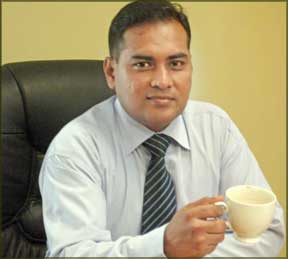|
Vallibel Finance, Jt CEO, Russell De Zilva
Vallibel contributes more green energy to the nation
[Profile]
Full name:Anton Russell De Zilva
Designation : Jt. CEO,
Schools attended : Nalanda College, Colombo 10 and University of
Moratuwa
Educational qualifications : PG (Dip) , Bsc Eng( Hons)
Working experiences : 12 years in the Renewable Energy Industry
Favourite sports : Swimming
Civil Status : Married to Kalhari, Four kids (Kulodya, Mindiya, Thinodya
and Senodya)
Date of birth :1972-12-05
Office address : Vallibel Power Erathna PLC, 27/2 East Tower, World
Trade Center, Colombo-01.
Indunil HEWAGE
Vallibel is a diversified conglomerate which has invested in
financing, banking, leisure, garments, manufacturing industry and the
power sector. Under Vallibel power, it develops renewable energy
projects to generate electricity and supplies electricity to the
national grid.

Vallibel ventured into the power generating business in early 2000
and has successfully commissioned its 10MW plant in 2004, which later
went public with a record breaking oversubscribing shares in 2006 and
has generated substantive profit for its shareholders. Since then,
Vallibel has invested extensively in the hydro power sector,
contributing more and more green energy to the nation.
Vallibel Finance, CEO, Russell De Zilva, in an exclusive interview
with the Daily News Business
Q: What are the current projects that are in operation under
the Vallibel Group?
A: With an installed capacity of professionally engineered
10MW “Erathna” mini hydro projects, simultaneously the Vallibel
engineering team have developed 8.64MW, “Way Ganga“ small hydro power
projects in the same year and 2MW “Barcaple” small hydro power projects
in 2007 under Didul (Pvt) Ltd.
Identifying the further potential in Kuru Ganga, in the Ratnapura
District, it again successfully commissioned its 6.5 MW “Adawikanda”
small hydro power project, under Alternate Power Systems (Pvt) Ltd in
2009.
Securing professionalized talents, Vallibel Power ‘Erathna’ PLC,
acquired Country Energy (Pvt) Ltd to develop 4.65 MW Kiriwaneliya hydro
project and 7.2 MW Denawaka hydro project, while tying up with the
national grid on December 2011 and February 2012 consecutively.
|

Vallibel Finance, Jt CEO,
Russell De Zilva |
Recognizing the importance of local value addition and the
development of local manufacturing industry as an essential driver of
socio-economic development of the country, Vallibel has taken a
strategic decision to develop a 850kW pilot wind power project, using
locally manufactured wind turbines supplied by Vawin (Pvt) Ltd, Sri
Lanka.
Q: What is the Vallibel power contribution to the national
electricity demand?
A: The CEB has recorded its ever highest daily electricity
demand of over 35 GWh recently. With the newly commissioned two power
plants, Vallibel can deliver 100GWh of electrical energy annually to the
national grid, which is equivalent to the three days electricity
consumption.
At present, the annual electricity demand will be generated by the
total installed hydro power plant capacity of 1600 MW.
Out of that total hydro wealth 1400 MW belonged to the CEB and little
over 200 MW owned by small private power producers. The Vallibel Group
contributes to that by an installed capacity of 29 MW, which accounts to
an annual generation of 100 GWh electricity annually, to the system with
a 15% market share from private power producers.
Q: Where do you likely see this number to be in the near
future?
A: Sri Lanka has the estimated potential of four small
hydropower projects of over 500 MW and nearly 50% of the resources are
under current development. Vallibel also owns new permits of cumulative
capacity of 15 MW under its project development companies and
constructions of some of the new projects are schedule to start soon.
Q: How far is Vallibel in success to generate electricity from
other renewable energy sources?
A: Our research team had already identified the potential of
wind energy and solar PV installations in Sri Lanka. We cannot just rely
only on hydros and are trying to find out options to make other
renewable energy sources affordable to generate electricity in Sri
Lanka. In line with that, we have set up a pilot wind power project in a
complex terrain on the Balangoda central hills. This project is to show
the possibility of harnessing the wind resources scattered over the
central planes were we have less developed infrastructure which restrict
the transportation and installation of wind turbines.
Q: How has year 2012 been so far?
A: We are experiencing unexpected dry weather this year, in
our hydro power plant catchment areas, which have adversely affected the
power generation. This is the worst year recorded in the last decade.
When compared to the last year, power generation has reduced by 22%,
but we are expecting that to be normalized soon as the monsoon has
started.
Q: As the CEO of the company, how do you see the sector and
what you believe?
A: A development of hydro power projects is a great business
which operates in a very attractive market space; fact of never
compromising the quality has brought us the confident that we will make
the best out of anything. Managing the hydro power business prudently is
not a difficult task but we have to understand the fact that every day
market barriers are rapidly growing against the renewable energy sector
in Sri Lanka. Our well qualified technical professionals have become
increasingly adapt in recent years in driving the best available result
from uncertain circumstances. Our Chairman, Dhammika Perera’s guidance
of “We should never lose sight of the fundamentals”, makes us not to see
any barriers, but only hurdles. That is the core value of Vallibel Power
and the philosophy I believe which takes us to success.
Q: How do you plan to achieve the future growth aspirations of
the company?
A: During the past years, we have grown up to a state that we
can do work with confidence in the renewable energy industry and spread
our operation globally. Now, we are negotiating with parties to develop
hydro power projects in Nepal and the African region. This will bring
international recognition to Vallibel and to our mother land, while
bringing in foreign currencies to the country.
Q: What do you think about the mini hydro and other renewable
energy industry in Sri Lanka?
A: Looking at the overall renewable energy industry, I must
say that this is one of the best industries which have developed
professionals for nearly two decades. This is an area where engineers
can get their hands on experience.
Almost all the projects commissioned in Sri Lanka are designed,
constructed and managed by Sri Lankans.
Technology wise, they are no second to the plants running in Europe
or any other developed countries. But as a nation, there is a lot to
explore in renewable energy in the country. Even though we have
estimated 5000 MW of wind power potential, our infrastructure has not
developed to the adequate level to absorb it. Starting to work on
research projects such as solar, will definitely clear the paths.
Q: What do you think are the challenges Sri Lanka’s hydro
power industry faces to achieve its targets?
A: Normally, the cost of turbines, generators and penstocks
alone, are 50% of the project cost in case of direct imports.
Depreciation of the Rupee has increased the direct cost by 15~ 20%
and when taking account of the interest rates and the lack of attractive
projects, investors will lose interest in this sector.
To develop these projects, in such a difficult environment, industry
should be given attractive incentive schemes and more assistance from
relevant authorities’ in obtaining the necessary statutory approvals.
Q: What are the global trends in the industry, and how will
this impact be on the local industry?
A: Globally, the wind industry is growing at 30% and annually
have created employment for more than 400,000 people.
The world installed capacity is around 120 GW and even if we take
account of 0.5 % of the market share of annual incremental demand; it is
around 200 MW of machinery supplying market. So there is plenty of
opportunities available for the local manufacturing industries in the
international market.
Q: What could be the supportive role played by the relevant
statutory agencies?
A: To successfully complete one project, we have to undergo
very strict approval processes from governing institutions and in most
cases, we have to appreciate in good faith the effective support
extended by institutions such as the Ceylon Electricity Board,
Sustainable Energy Authority, Board of Investment and also the local
communities.
|



